 Petzlover
Petzlover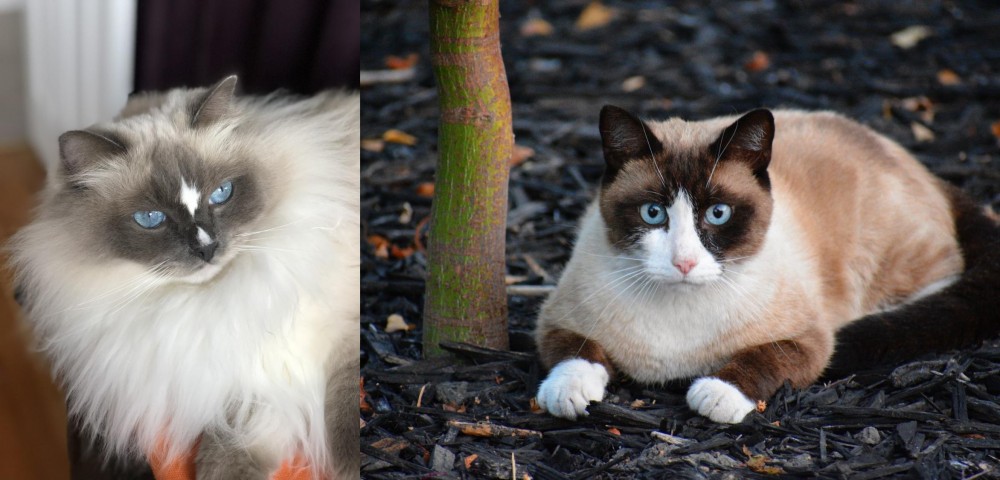 Both Ragdoll and Snowshoe are originated from United States. Both Ragdoll and Snowshoe are having almost same weight. Ragdoll may live 3 years more than Snowshoe. Both Ragdoll and Snowshoe has same litter size. Ragdoll requires Moderate Maintenance. But Snowshoe requires Low Maintenance
Both Ragdoll and Snowshoe are originated from United States. Both Ragdoll and Snowshoe are having almost same weight. Ragdoll may live 3 years more than Snowshoe. Both Ragdoll and Snowshoe has same litter size. Ragdoll requires Moderate Maintenance. But Snowshoe requires Low Maintenance
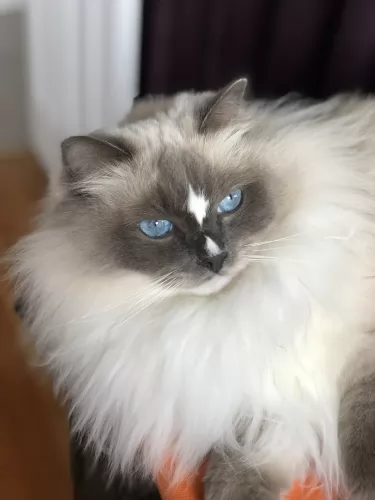 It was in the 1960s that a regular domestic longhaired cat with white fur produced several litters of cats. There was one litter where the kittens with a docile temperament, seemed to go limp when picked up.
It was in the 1960s that a regular domestic longhaired cat with white fur produced several litters of cats. There was one litter where the kittens with a docile temperament, seemed to go limp when picked up.
Anne Baker set out to start a breeding program and all Ragdolls are descended from Baker's cats. In fact, the cat credited as the original Ragdoll was a cat with the name Josephine, and Ragdolls are sometimes called ‘the daughters of Josephine.
Baker set up her own registry, the International Ragdoll Cat Association. The IRCA still exists, but another pair developed the Ragdoll standard that is accepted by major cat registries. Today. The biggest international Ragdoll breed club is the Ragdoll Fanciers' Club International.
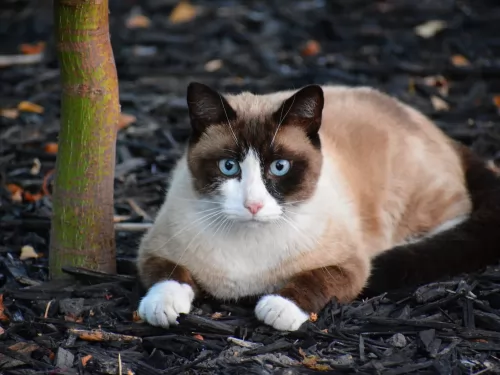 The Snowshoe is a short-haired, natural breed of cat. It is a bit similar in looks to the Siamese cat.
The Snowshoe is a short-haired, natural breed of cat. It is a bit similar in looks to the Siamese cat.
It was in the late 1960's that Dorothy Hinds-Daugherty from the USA devoted her time to developing a breed which was a mix of Siamese cat and American Shorthair. There was much enthusiasm for the new breed – the mesmerizing blue eyes and the lean, lithe, athletic body, .
This rare cat has been approved for championship status. In 1982 the Snowshoe was approved for championship status by the CFF and later by the American Cat Fanciers Association in 1990.
This beautiful cat has strict standards laid down for breeding.
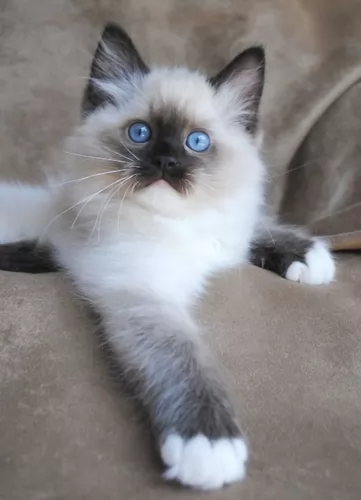 The beautiful Ragdoll cat is a large, heavy-boned cat. Sometimes they can be 9kg in weight. It has a soft, silky coat that can be semi-long to long.
The beautiful Ragdoll cat is a large, heavy-boned cat. Sometimes they can be 9kg in weight. It has a soft, silky coat that can be semi-long to long.
The cat has remarkable blue eye and the beautiful silky coat comes in several shades such as cream point, chocolate point, seal point, and others.
The ears are medium-sized and, the legs long and strong and the oval-shaped eyes are blue. The cat is known as a pointed breed, which means that the body is lighter in color than the points.
Ragdolls are casual, even-tempered, laid-back kind of cats. They are playful but not particularly energetic so you won’t find these cats leaping onto top perches such as what other cats do.
These docile cats love to be petted and pampered and carried around. It literally goes limp with pleasure at being loved and pampered by its human companions. He’s such a friendly cat who, much like a dog, will even greet you at the door and learn to play some games.
This amicable cat gets on well with children and other pets in the home, making a splendid family pet and he can even learn to walk on a leash.
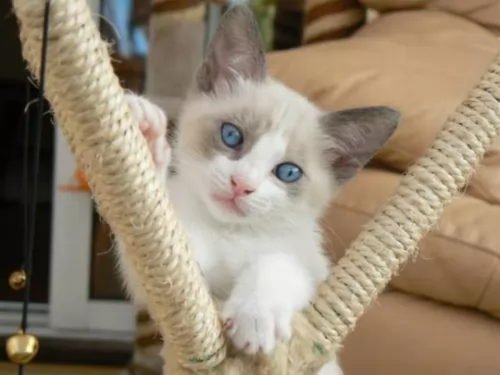 The Snowshoe is a medium-sized cat, with the body being longer than many other cat breeds.
The Snowshoe is a medium-sized cat, with the body being longer than many other cat breeds.
A distinctive feature with him is the white paws.
The cat can weigh between 5 to 7 kg. The legs of the cat are long and strong and the medium-length tail gradually tapers to a tip. The ears are fairly large with rounded tips. The smooth, short coat is white, brown, tan, and black and without an undercoat. He reminds you of a sweet treat - hints of chocolate and coffee shades with vanilla or light cream. He is pure white at birth, but after a few weeks, the coat undergoes a significant color change.
The face, ears, tail, and legs are darker in color than the rest of the body. The eyes of all Snowshoe cats are a sky blue.
Snowshoes are friendly, docile, and affectionate. They lap up the company of their human family, getting on well with children and other pets. They tend to be shy of strangers.
The Snowshoe is a fairly vocal cat and will let you know when he is hungry or he just wants to talk to you.
These cats are intelligent too and he can be taught a few tricks. He is very sociable and doesn’t like to be left on his own for long periods of time. Ideally, these cats should have a constant companion. They are active cats and like to be busy. You’ll need to spend some time with your Snowshoe as these cats love fun and games.
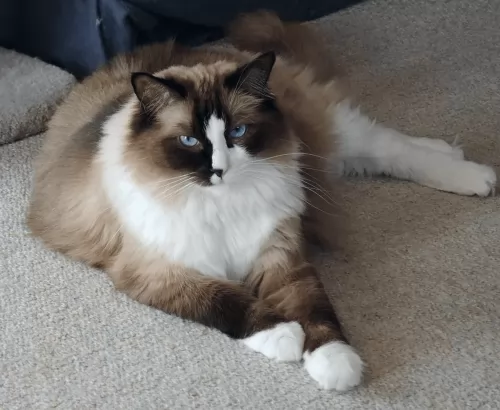 The Ragdoll really is a splendid cat for any family that loves pets. They are such loving cats and adore being pampered by their human owners.
The Ragdoll really is a splendid cat for any family that loves pets. They are such loving cats and adore being pampered by their human owners.
These cats get on well with children and other pets, and because they are such mild-mannered cats, you never find a Ragdoll striking out in anger. That is why it is so important that children be taught kindness and gentleness with animals like the Ragdoll and not to take advantage of its good nature.
Playful and entertaining, the Ragdoll is bursting with his own unique personality – a super feline companion for the whole family.
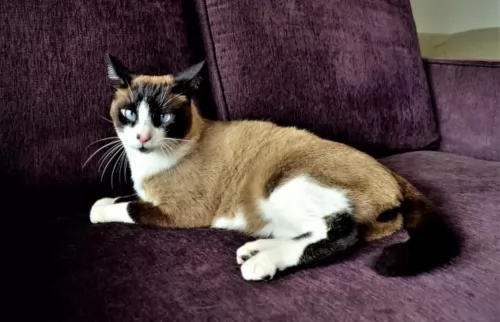 People who have already owned Snowshoes will tell you that they make splendid pets. They’re loyal and devoted to their human family, usually choosing a favorite person.
People who have already owned Snowshoes will tell you that they make splendid pets. They’re loyal and devoted to their human family, usually choosing a favorite person.
The fact that the Snowshoe is social and becomes so attached to people, makes him an awesome pet but just because he is fairly docile and amicable doesn’t mean he should be left alone for hours at a time. You’ll hear him voicing his displeasure at this.
He is certainly not a solitary cat, but an affectionate and most extraordinary cat.
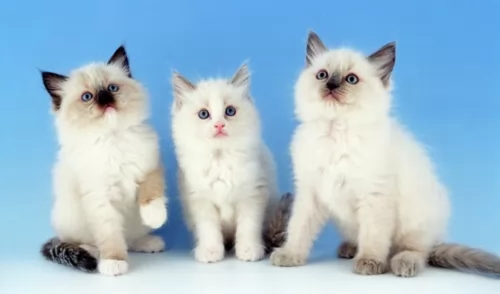 All cats, whatever the breed, can succumb to any one of the many cat diseases there are. A high-quality diet, a loving, caring lifestyle, the appropriate vaccines and parasite treatment can all help to keep your Ragdoll as happy and healthy as possible.
All cats, whatever the breed, can succumb to any one of the many cat diseases there are. A high-quality diet, a loving, caring lifestyle, the appropriate vaccines and parasite treatment can all help to keep your Ragdoll as happy and healthy as possible.
Ragdolls are generally healthy cats but you may want to look out for bladder stones. Another disease to watch for is a heart condition known as hypertrophic cardiomyopathy. This heart disease causes thickening of the heart muscle.
While the disease is usually found in older cats, there is also a juvenile form that affects younger cats, and often young Ragdolls.
Sometimes there aren’t symptoms, and if your cat has labored breathing, loses his appetite or has vomiting, you may need to get your Ragdoll to the vet who will listen to his heart for abnormalities.
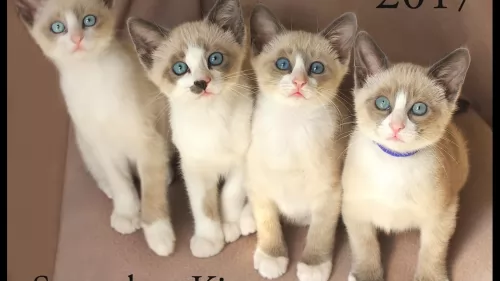 Your Snowshoe may well be a healthy breed, but every cat is prone to some illnesses. We look at some cat diseases you need to be aware of -
Your Snowshoe may well be a healthy breed, but every cat is prone to some illnesses. We look at some cat diseases you need to be aware of -
This is a feline disease found more often in Siamese cat breeds. The cat develops this protein disease between 1 TO 5 years of age. Amyloidosis is when there is an abnormal deposit of the protein complex amyloid into the liver, spleen and kidneys, resulting in bacterial infections, inflammation, and cancer.
Your Snowshoe’s teeth are particularly prone to gingivitis which is inflammation of the gums. It can lead to more serious conditions if left unattended. Other dental problems to watch for are bleeding gums, broken teeth, and swelling of the gums.
Have your Snowshoe spayed or neutered. Spaying or neutering decreases the likelihood of some cancers. Both males and females are less likely to roam too, making them more domesticated. The cat is less likely to spray urine as a territorial gesture too. Spaying or neutering is imperative if you want to avoid your cats being parents.
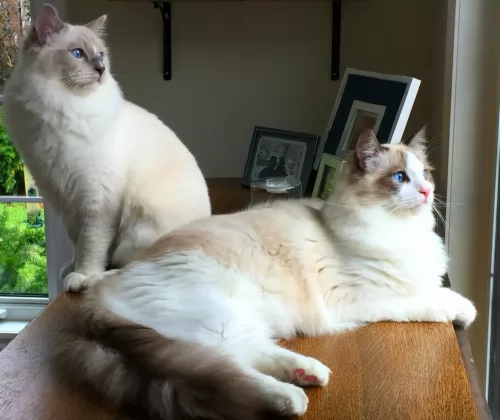 Even though the Ragdoll’s coat is long and silky, it’s the kind of coat that doesn’t require too much maintenance. Certainly, you’ll want to comb and brush it once a week.
Even though the Ragdoll’s coat is long and silky, it’s the kind of coat that doesn’t require too much maintenance. Certainly, you’ll want to comb and brush it once a week.
The other grooming he requires is regular nail trimming.
Understand your Ragdoll’s eating habits. Remember cats are carnivores and this means that their diet has to be made up of meat. Food puzzles are great for these cats but whatever snacks and treats you give your Ragdoll, make sure that they are healthy for a cat and don’t give your cat digestive problems.
Provide your Ragdoll with a litter tray and make sure to remove the feces every single day.
Cats are prone to periodontal disease, but while it has become the latest trend to brush your pet’s teeth, this can be upsetting and traumatic for a pet. A good diet can help to keep teeth healthy. Your vet can look inside your pet's mouth to see if any teeth need attending to.
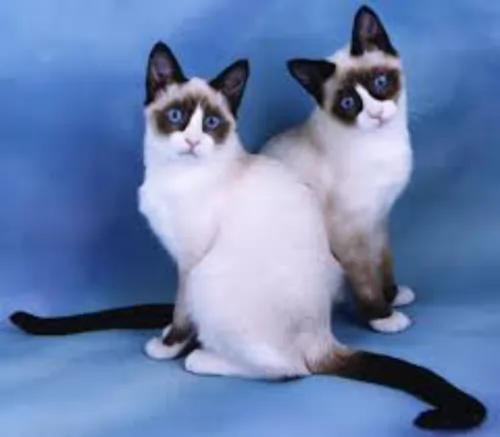 Provide your Snowshoe with the best cat food that there is. Always be aware of excess weight with your cat and avoid it at all costs. Extra weight is an influential factor in the development of diseases such as diabetes and arthritis.
Provide your Snowshoe with the best cat food that there is. Always be aware of excess weight with your cat and avoid it at all costs. Extra weight is an influential factor in the development of diseases such as diabetes and arthritis.
A proper diet for your Snowshoe will ensure that your vet expenses are less. The nutritional needs of your Snowshoe will be protein, minerals, vitamins, fatty acids, and enzymes. Your cat is a carnivore and his food needs to be high in meat and protein. He isn't going to require any carbohydrates. Speak to your vet about the best food for your feline friend.
Provide your Snowshoe with a constant supply of fresh, cool water.
Your Snowshoe will appreciate some cooked meat once in a while. Some tasty tuna now and then which is rich in omega-3s will also go down well.
Cats are fastidious about cleanliness so ensure his litter box is always clean. Scoop out the feces every day.
The Snowshoe has a low maintenance short coat, and a weekly brush will keep his coat shiny and glossy and he’ll love the attention this brushing session provides.
Cats like to scratch, so provide your Snowshoe with a scratching post as this will save your furniture from being used as a scratching post.
The Snowshoe cat is regarded as a low maintenance cat in terms of his short coat which needs to be brushed once a week. Brushing the hair will remove dead, loose hair and distribute skin oils to keep the coat in tip-top condition.